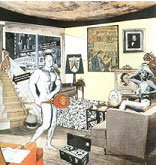European Academies and Universities of Art online
– University of Arts Düsseldorf, Martin Gostner class
medien.kunst.tirol presents an exhibition series, for which classes and institutes of national and international Universities
of Arts develop projects, to show exemplary methods and schemes of current art-productions in the context of apprenticeship and
research.

The title Just what is it adverts to Richard Hamilton’s drawing ‘Just waht is it that makes today’s home so different, so
appealing?’ (1956), reckoned as the first work in Pop Art. Hamilton became famous for introducing everyday life items and
technologies of the 20th century to finde arts. Details of this ‘Pop Art Icon’ already refer to current art productions – film,
video, photo, music, ….
Just what is it…#V
“Der cartesische Korridor”
Johannes Döring, Kerstin Fischer, Alexander Gering,
Mi-Reyon Kim, Agnes Lux, Christine Modlrickx, Sarah Müller,
Jeannette Schnüttgen, Beate Seibel, Dennis Strootmann,
Katrin Wegemann, Sven Weigel
Academy of Arts Düsseldorf, Martin Gostner class
Meanwhile, I plead with myself, that utterly there’s nothing in this world: no sky, no earth, no ghosts, no bodies, thus,
neither me? By no means; i have been, for sure, whensoever i plead with myself.
Rene´Descartes, meditation on foundations of philosophy
Renatus Cartesius imagined in his legendary and outrageous plenty-resulting thinking-away exercise’ (by phenomenologic
speculation) , what would happen, if nothing would be real. Already with his optic experiments, he gathered that the process of
apperception underlies an intrinsic difference of subjective and objective reality.: Things are not what they seem to be. He
came across this
suspicion of illusion, that seemed to take away every dependable reason of existence, with a decided reference to an
ego-logocentric unity: It is that, which, as a matter of principle defies thinking-away, because it’s this thought itself. It is
the cogito, the numinous element that makes a creature an ‘animal rationale’. Decartes imagines a Homunculus, it transcends from
theosphere and incarnates into this world, more precisely: into the head. When arrived, it’s using the body like a machine – the
senses tranfer the required sense-data.
This thought is a historic cesura with a long prelude and sequel. A sort of thinking radicalizes, that began with the bible’s
creative genesis and, until today, walks abroad in a techno-gnostic form, the exceeding virulent way.
Talking about occidental metaphysics, that beyond it’s late european base, rules the planet in a securalized way.
The metaphysics of here and there, doubles and bisects the world, by substracting iself from an imaginary cognitive instance:
The ego places itself in difference to the world. The metaphysic-doing instance only exists in this vertical projection,
whereupon it still ‘imaginging’, creates a horizontal topology. Accordingly, the word is a huge graticule. Whatever, euklidic
odr hyperbolic kind, planar or spheric, the cosmos itself is the case of totality of all cases, and therein somekind logically,
regardless of being binary or multivalued. The inherent doubled nature of ratio is clear: On the one hand, the fact of ‘not
being’ subjects to logic, on the other hand, because of being the inner author of this logic, it acts acosmic and quixotic. It’s
homeland-topos it the utopistic non-location. When referring to the whole world, it means this lot, and therin, implicates
another. In this subtraction and duplication of worlds, the platonic phantasm can only be avoided by claiming a nameless and
unthinkable differentness of the parallel-world.
The cosmology can only persist in being a ‘system of belief’, hiding it’s basic fundament behind all commitments, hopes and
threats, so no one even dares to remember the existence of a secret. The basic requirement of collective belief thinks of, what
persists the end of the world, it encounters the ‘world-hole’ in the galactic center, before and afterwards own life, or more
common: in a dreamless deep sleep. The intellectual person, at last answers this existential problem with courageous realism
through conceding that the world will subsist without his disposable finiteness. This is all about an ideal persistence, the
realistic imperative works optimally the other way round, too: the gnostic hope sounds in the same breath like the decrepitness
of mind. That’s why Sokrates knew, at he hitted his peak, that he knew nothing. But Sokrates outflanks himself with this fact:
his last word emerges as an epitaph; he wants to say something, even after death. In this sokratistic paradox our fundamental
base and dilemma can be found, and it shows the impression of innocent-devotional ikonosclasm. Knowledge is positioned right to
its opposite, pretending to mean such. In a quaint solipsism you seriously assure knowledge about something, that exists
independent of any knowledge. Thus, you argue nothing else, but immortality of own thinking. Responded to it, no other belief is
possible, but that, (possible doubts abolished) doesn’t excuse the circumstance that a collective phantasm of para-normal
elative is initiated.
The problem of such negative epistemology puts forth the early 21. century freedom-debate: if, and to what extent, natural
determinism (the impartial world) simulates freedom and subjective consciousness. The question on freewill is congruent to those
cognitive immortality because the subjectivity radicalizes to a resistent transcendental, everything objective opposed to it.
That this question, as well as all the other affecting in person, is chronically unanswered, is not a problem of lacking
intelligence – quite the contrary. If we believe that we are thinkers; we are – thinking. And because of the fact that, wanting to
be non-thinking is denied, we are bounded to outdare unthinkability before it catches us. We are neither eternal nor unlasting,
but never proper existent. And just because we strangers can’t figure it out, there’s nothing else for us but abiding in the
subjective egosphere, asking and searching furthermore.
Alexander Gering
